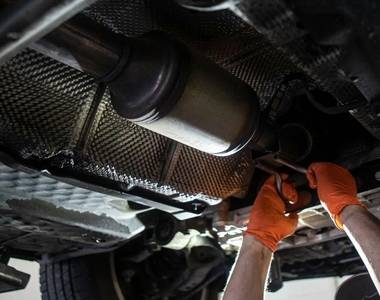Whether you're selling your car to purchase a new one or you simply aren't driving it anymore, we're willing to bet you're concerned with the insurance policy. This article tells you everything you need to know about cancelling your car insurance when selling your car.
It's highly unlikely the time you sell your car will line up precisely with your insurance renewal date. You'll most likely have to cancel your insurance policy before that date.
The good news is, you can cancel your car insurance policy at any time. New legislation came out in 2022 that makes it easier than ever to do so (though you will still incur some small costs).
If I sell my car, should I keep the insurance running? A quick look
Selling a car with an insurance policy isn't like selling a car on finance — that is, you don't have to wait for the policy to be transferred or anything like that. That said, you 100% should cancel your insurance policy immediately when selling a car.
This is because:
- The new owner of the vehicle will need to get their own insurance policy
- You're required to inform your insurer that you no longer have the vehicle
- You'll be paying for insurance cover you don't need (i.e., for a car you no longer have)
- Neglect to cancel could result in a claim against your insurance policy if the owner gets in an accident
Whether you sell your car online, to a dealership, or to a private buyer, you should cancel your insurance as soon as you sell it. But don't do so before you completely transfer ownership and receive payment for it.
What if I'm trading in my old car for a new one?
If you're trading in your old car when buying a new one, the process is slightly different. You won't need to cancel your insurance policy right away. But you do have to act.
Most insurers offer a "transfer of ownership" policy. You can transfer ownership of your insurance policy from one car to the next, provided both are registered in the same name. However, you will need to contact your insurer and provide them with details about the new car before they can transfer over any existing cover you have.
Be aware if you do this your insurance premium may fluctuate depending on the type of vehicle you buy. If it's a sports car, for example, you might see an increase in your premium.
Your insurer (or insurance broker) will also likely charge an administration fee for moving your policy over. This can work out cheaper than cancelling your old policy and buying a new one, but it's worth comparing rates each time you change cars.
What to know before cancelling your policy
If you do decide to cancel your car insurance policy when selling your car, there are several variables that come into play. How much of the insurance cost you recoup will depend on the length of time you had your policy for and how far through the year it runs.
Cancelling during the 14-day cooling-off period
Under UK law, you have a 14-day "cooling-off" period when you purchase any kind of service, including car insurance policies. This means that for the first two weeks of your policy, you can cancel at any time for a full refund. Some insurance providers offer longer cooling-off periods — check with yours to find out specifics.
The cooling-off period starts once you've received your documents (or when your cover starts, whichever happens later) and runs until midnight of the 14th day after. If you cancel during this time, you're legally entitled to a full refund.
Cancelling within the cooling-off period may still warrant a fee from your insurer (to cover their costs). This usually isn't much — no more than £50 — but make sure to double-check your documentation before selling to ensure you aren't hit with something unexpected.
Cancelling after the 14-day cooling-off period
14 days isn't much. And most people aren't selling their vehicle within the first two weeks of opening an insurance policy on it.
The good news is you're still able to cancel your policy after the cooling-off period. The bad news is you won't get a full refund. You will probably have to pay for the amount of time you were insured. You might also owe fees that come with early cancellation.
When you purchase insurance cover, you do so in one of two ways: upfront or through monthly premiums.
- If you pay for a whole year upfront, you will still need to pay for the amount of time you had the policy. Your insurer calculates this on a pro-rata basis. This means you'll pay for a proportion of the full year, depending on how much time has already passed. If you're already in the eleventh month of the policy, you can only expect a small refund.
- If you are paying monthly premiums, there would be no reason to refund you — you've already paid for all the months you had the policy. If they offer you a partial refund, chances are good the cancellation fees will eat up most of it.
Also be aware you will lose any no-claims bonus you had with the policy if you cancel early (since you aren't "claim-free" with the insurer for the whole year). And add-ons you took out with another company (e.g., breakdown cover) could be nonrefundable or require an additional contact.
Cancelling after you have made an insurance claim
Nobody will stop you from cancelling your policy after you've made a claim. But you'll still be liable for cancellation and administration fees. Your insurer may have terms and conditions that impact your refund as well.
- If you purchased an annual policy, you probably won't not be entitled to a refund. Some insurers have this as a standard, others won't allow it if your claim was a certain percentage of the total cost, or if you made more than one claim in a year.
- If you make monthly payments, you may be on the hook for the entire amount outstanding. Some insurers require customers to pay the remaining months down in a lump sum before cancellation if the customer has made a claim (again, depending on terms).
When in doubt, call your insurer and ask. They'll provide you with the exact details for cancelling your policy, and you can perform a cost-benefit analysis on whether it's worth doing away with before selling your car.
Cancelling if your car is declared a SORN
A Statutory Off Road Notification (SORN) is a way to declare a vehicle off the road and exempt it from car tax. It also means you're not legally allowed to drive or store the car on public roads, so therefore, you don't need insurance for it.
If you declare your car as a SORN to the DVLA and cancel your insurance, you will be liable for the costs if something happens to it (such as damage or theft). If you're near the end of your policy, it might be better to keep the policy and secure your no-claims bonus. If you’re selling a non-running car or a damaged car, however, this might not be a concern for you.
Transferring your auto insurance policy
Transferring your insurance policy after selling your car is quite simple.
- Contact your insurer and let them know you are transferring your policy from one car to another.
- Provide the necessary details about the new vehicle (make, model, registration number).
- The insurer will adjust your policy accordingly and update the documents.
- Your policy will now be active on the new vehicle until its expiry date — no need for a new policy or for cancellation.
Your insurance provider will charge you an admin fee to complete the transfer — usually somewhere between £15 and £50. In most cases, this is far less than you'd pay for a new policy or cancellation fees. In our experience, fees are cheaper online than over the phone.
Wrapping up
If you're selling your van, car or motorbike, you should cancel your policy if:
- You're getting rid of it and not purchasing a new one.
- You're buying another vehicle but found a better insurance policy elsewhere.
- You declared your vehicle a SORN and you're selling a non-running car.
It's better to keep your policy if:
- You're nearing the end and qualify for a no-claims bonus that outweighs the benefit of a month or two's refund.
- You want to transfer your policy to another vehicle.
- You filed a claim on your car, but cancellation costs more than the remaining months of coverage or what you'd get for your car.
Regardless of which action you decide to take, you will have to do something when you sell your car. And it will always involve notifying them in some way. Make sure you always check your provider's terms and conditions to understand what kinds of fees you can expect.
Want to learn more? These are the questions our sellers ask us the most.
Can I take insurance off my car if I'm not driving it?
You certainly can take your insurance off your car if you aren't driving it. But you will be on the hook for damages if something happens to it while it's off the road. You will also be out of luck if someone steals it.
What happens to insurance when I sell my car?
Nothing will happen to your insurance when you sell your car unless you notify your insurer. However, you should notify your insurer and take action on the policy because you'll no longer require it as your old car isn't yours anymore. You can also be held liable for claims made on your policy until the day of cancellation.
Can I sell my car with an open insurance claim?
You can sell your car with an open insurance claim, but it isn't always advantageous. Many providers require you to pay your entire remaining balance to cancel if you have an open claim, in addition to administrative fees. Especially if selling your car isn't urgent, it's probably better to wait it out.
Can I cancel my car insurance if I pay monthly?
You can cancel your car insurance if you pay monthly. However, you won't be entitled to a large refund like those who buy annual cover. Some insurers refund you for the days of the month you didn't use, but administrative and cancellation fees usually cancel this out.
Can I transfer my insurance policy to the new owner of the car?
Although you can transfer vehicle ownership by notifying the DVLA, insurance policies will remain in your name. Your buyer will have to buy their own insurance policy. However, you can transfer your insurance policy to another vehicle if you choose.
Is it mandatory to notify my insurance company about the sale of my car?
Technically, nobody is stopping you from neglecting to tell your insurance about selling your car. But there is no logical reason to do so (and potentially negative consequences if a claim is filed on the vehicle with the new owner. Although it isn't mandatory, you definitely should.
What happens if I forget to cancel my insurance after selling my car?
If you forget to cancel your insurance after selling your car, you should do so right away. You'll still be liable for any claims made on your policy until the day of cancellation. You will also be paying for insurance on a car someone else owns, which is pointless.
Are there any penalties for not cancelling insurance after selling my car?
There aren't any "penalties" per se, but there are negative consequences. If your old vehicle is involved in an accident and the other party files a claim, you'll be liable — even though the car isn't yours anymore. Then, it'll show on your record and you'll have to pay more for insurance in the future.
How long do I have to cancel my insurance policy after selling my car?
There is no set time frame for insurance cancellation. Some insurers impose a cut-off date to prevent fraud, but it's usually 30 days after the sale, depending on your policy. In any case, it's best to cancel your insurance as soon as you can to avoid the above mentioned consequences.
Will my insurance rates be affected if I cancel the policy after selling my car?
If you have a major lapse in car insurance cover, you might be penalised with higher premiums when you buy a new policy. But insurance companies usually don't take into account shorter lapses in coverage, especially if they were only for selling a car.











